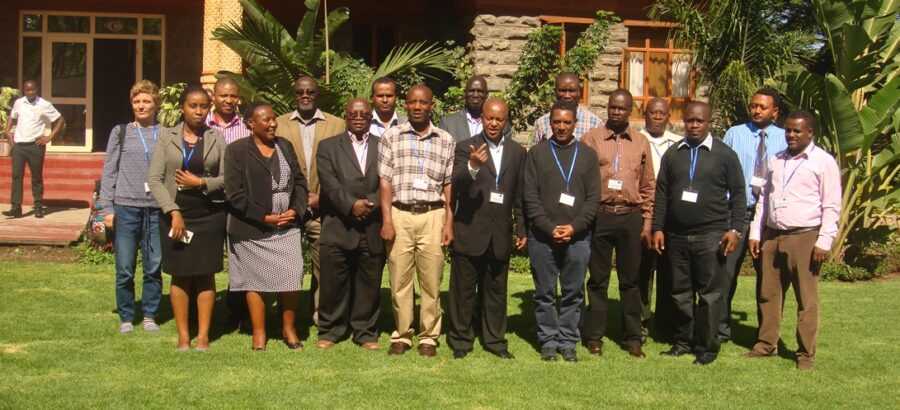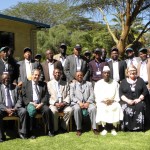Background
The IGAD Centre for Pastoral Areas and Livestock Development (ICPALD) has recently organized the consultative workshop on mobile phone applications for animal health and disease reporting in the IGAD region in June 3rd, 2015 in Naivasha, Kenya. The objectives of this one-day consultative workshop were to have the assessment report presented to the stakeholders in the consultative workshop, to discuss, enrich and validate the draft report; and to seek inputs/recommendations from the stakeholders.
Mobile phone applications for disease reporting and data collection are surveillance and disease control systems being financed under the “Improving animal disease surveillance in support of trade or surveillance for trade-sensitive diseases (STSD) project” that is jointly coordinated and implemented by IGAD and AU-IBAR in the IGAD member states. The specific objectives of the workshop were; to have the assessment report presented to the stakeholders in the consultative workshop, to discuss, enrich and validate the draft report; and to seek inputs/recommendations from the stakeholders.
The welcoming remarks were made by Dr. Ameha Sebsibe, on behalf of the ICPALD Acting Director and Dr. Zelalem Tadesse on behalf of the AU-IBAR Director. A total of 20 participants drawn from IGAD MS of Ethiopia, Kenya and Uganda as well as from AU-IBAR, FAO-ECTAD, FAO-Uganda, IGAD-ICPALD, VSF Belgium in Uganda and VSF Germany in Kenya. The one-day workshop discussed presentations and deliberated on the existing mobile phone applications used for disease reporting at regional, continental and global levels as well as the findings of the assessment, the case studies on mobile phone applications, lessons learnt and recommendations.
The meeting provided a number of recommendations; some of which are the piloting of selected applications planned in some IGAD MS that will use chosen mobile phone platforms with training to provide technical capacities for the potential users of those new technologies recommended for data collection and disease reporting in the IGAD region. Member States AU-IBAR and IGAD will choose machines that are cost-effective, user-friendly and with power saving capacity. The workshop recommended that the MS make the final decision in choosing a mobile phone application for adoption in their respective countries using the findings of the present assessment as well as future pilot of other applications, in consultation with regional bodies.
Objective of assessment/study
To have the assessment report presented to the stakeholders in the consultative workshop, to discuss, enrich and validate the draft report; and to seek inputs/recommendations from the stakeholders.
Summary of proceedings / Outcome
After the welcoming remarks from ICPALD and AU-IBAR, a presentation on objectives and expected outputs made, followed by another presentation on overview of disease reporting status in the IGAD region, which was followed with presentations by the consultant on; the existing mobile phone applications used for disease reporting at regional, continental and global levels; and the findings of the assessment, the case studies on mobile phone applications, lessons learnt and recommendations.
IGAD/ICPALD and AU-IBAR are grateful to the European Union (EU) for having financed this event under STSD funding. The following are the workshop recommendations:
- AU-IBAR and IGAD to pilot recommended Open Data Kit (ODK) in the-to-be selected MS of the region to draw lessons on its adaptability, extensibility, interoperability and cost-effectiveness for disease reporting by grassroots reporting agents;
- AU-IBAR, IGAD, MS, FAO and OIE to work closely in order to ensure the interoperability of ODK with ARIS , WAHIS and EMPRES-i;
- AU-IBAR, IGAD, MS, FAO and OIE to support MS in building their technical capacities for easy adoption and utilization of those recommended new technologies for disease reporting;
- The consultant to work closely with IGAD and FAO-Kenya to further evaluate the merits of Epi-Collect Plus and include the outcome in the consultancy report;
- AU-IBAR, IGAD and MS to subsequently choose machines that are cost-effective, user-friendly and with power saving capacity for use in the piloting of the selected applications;
- MS to eventually make final decision in choosing a mobile phone application for adoption in their respective countries using the findings of the present assessment as well as future pilot of other applications in consultation with regional bodies;
- The consultant to include, in the report, the status of the use of mobile phone applications for disease reporting in other IGAD countries not included in the assessment.
Reported by: Dr. Ameha Sebsibe, Dr. Samuel Wakhusama, Dr. Agol M. Kwai, Eva Nyaga, Oliver Salehe, Christine Jeptoo and Joseph Kiragu





